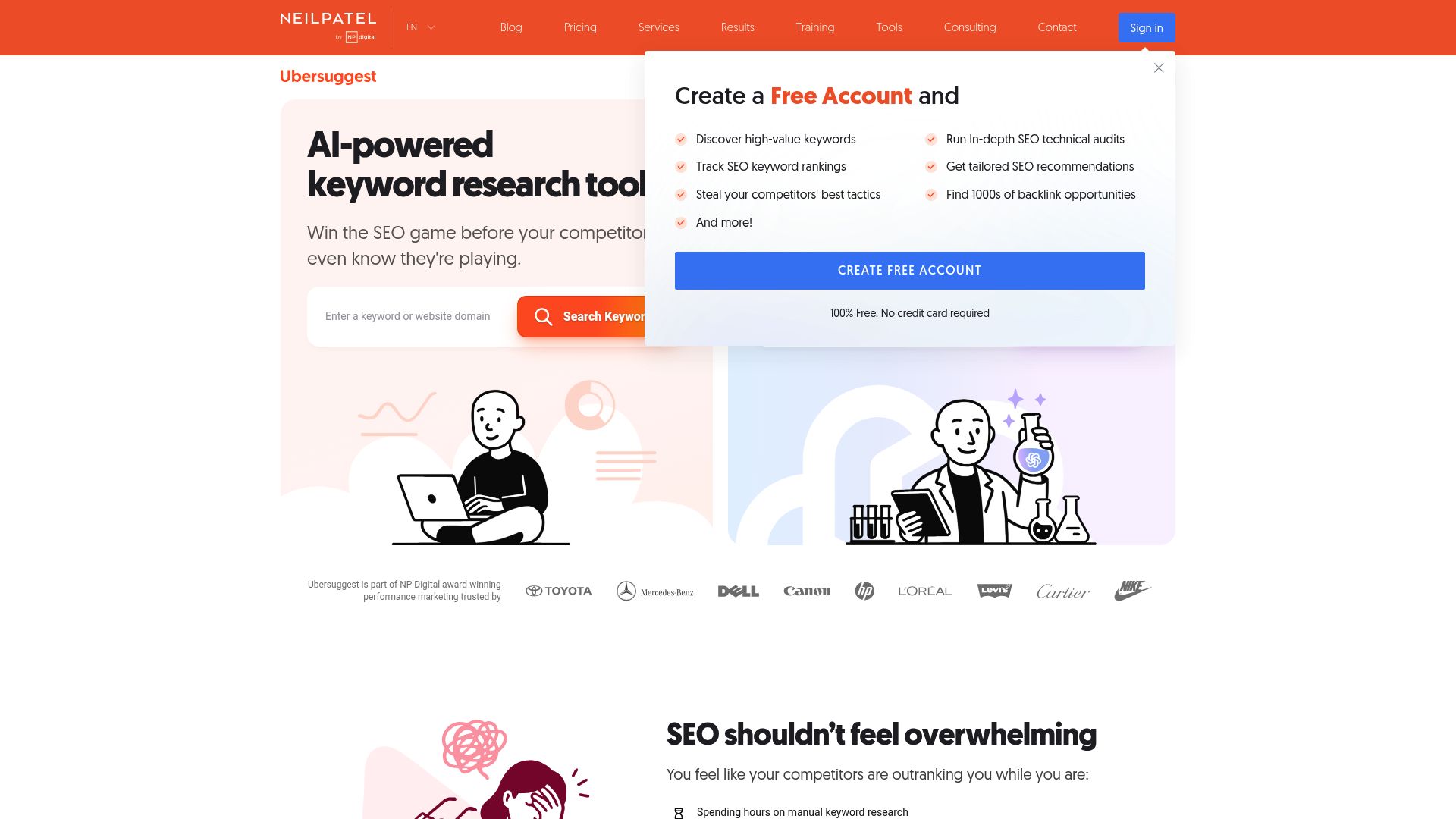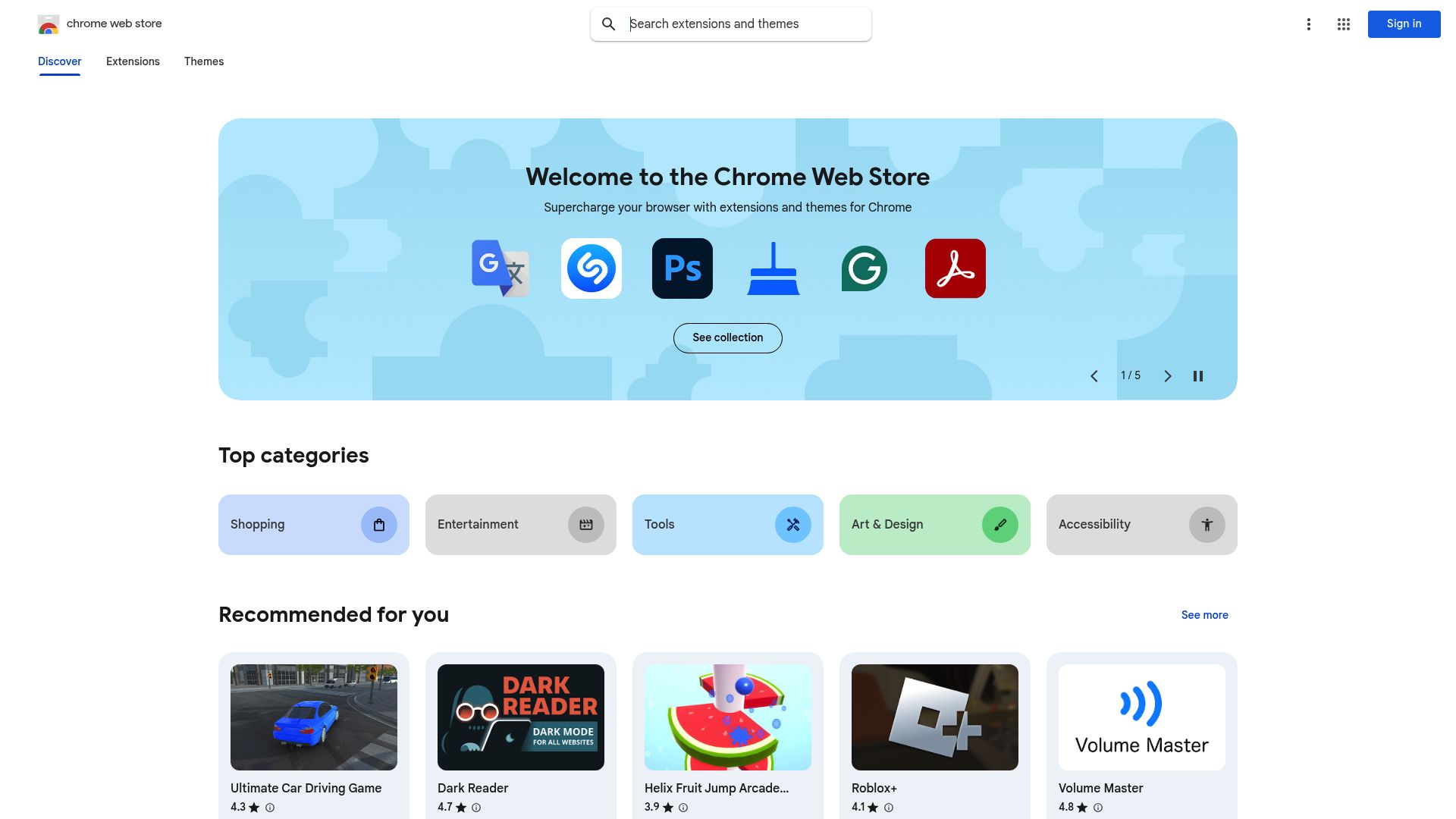I’ll be honest – I was skeptical when my friend recommended Ubersuggest. “Another SEO tool?” I thought. “What makes this one different?” But after my Ahrefs subscription nearly bankrupted my small agency last year, I figured it was worth a shot. Look, I’ve been playing around with this tool for months now, and here’s what I actually found – whether it’s actually worth your money or just more marketing hype.
This review provides what I discovered after putting Ubersuggest through real-world testing, comparing it to those premium alternatives that cost an arm and a leg, so you can figure out if it’s right for your business without making the same mistakes I did.
Table of Contents
-
TL;DR: The Bottom Line on Ubersuggest
-
Ubersuggest
-
Alternatives to Ubersuggest
-
Frequently Asked Questions
-
Final Thoughts
TL;DR: The Bottom Line on Ubersuggest
Here’s what I discovered after putting Ubersuggest through its paces:
-
Ubersuggest is a really good deal and actually user-friendly but don’t expect all the fancy bells and whistles
-
The lifetime payment option is honestly brilliant if you’re planning to stick with SEO long-term
-
Keyword database is way smaller than those expensive tools like Ahrefs and Semrush – you’ll notice
-
Perfect if you’re just starting out or running a small business, but you’ll probably outgrow it pretty fast
-
Those biweekly coaching calls with Neil Patel are legit – not just marketing fluff
-
Site audit and rank tracking do what they’re supposed to, but you’ll hit limits quicker than you think
-
Maybe just hire professionals if you want results without the headache of learning another tool
I tested this tool extensively, and while it’s not going to replace those enterprise platforms, it’s actually pretty solid for what it costs. The real question isn’t whether it works – it’s whether it works for what you’re trying to do and how much you want to spend.
Criteria Table
|
Criteria |
Rating |
Description |
|---|---|---|
|
Keyword Research Capabilities |
3/5 ⭐ |
Does the basics with search volume and difficulty scores, but that smaller database definitely holds it back |
|
Competitive Analysis Features |
3/5 ⭐ |
Basic competitor insights work for understanding traffic patterns and shared keywords |
|
Backlink Analysis |
3/5 ⭐ |
Reliable backlink data from Moz’s database with helpful opportunity identification |
|
Site Audit Functionality |
3/5 ⭐ |
Actually finds issues you didn’t know about with clear recommendations |
|
Rank Tracking |
3/5 ⭐ |
Daily tracking for desktop and mobile with local capabilities |
|
User Interface & Ease of Use |
4/5 ⭐ |
Finally, an SEO tool that doesn’t require a PhD to figure out |
|
Pricing & Value |
5/5 ⭐ |
Come on, it’s $29 a month with a lifetime option – total no-brainer |
|
Data Accuracy & Database Size |
3/5 ⭐ |
Core metrics seem accurate but that smaller database definitely limits research |
|
Reporting & Export Options |
2/5 ⭐ |
Basic exports that look like they’re from 2010 – don’t expect to impress anyone |
|
Customer Support |
4/5 ⭐ |
Good response times and those coaching calls actually add real value |
Ubersuggest
What Ubersuggest is Best Known For
So what exactly is Ubersuggest? It’s Neil Patel’s answer to all those ridiculously expensive SEO tools that make small business owners cry when they see the monthly bill. I mean, who has $200+ lying around every month for Ahrefs, right?
Here’s the thing – I’ve been using this tool for months now, and it’s basically built for people like me who need SEO data but don’t want to sell a kidney for it. The keyword research is pretty solid, and those traffic estimates? They’ve actually helped me spot some opportunities I completely missed before.
That Chrome extension though – now that’s where they got me hooked. Even on the free version, you get 40 searches a day. I literally use it every time I’m browsing and think “hmm, I wonder how competitive this keyword is.” It’s like having a little SEO assistant right in your browser.
Look, Ubersuggest isn’t trying to be the Ferrari of SEO tools. It’s more like that reliable Honda that gets you where you need to go without breaking the bank.

Features That Actually Matter
Alright, let’s talk about what you’re actually getting here. The keyword research gives you the basics – search volume, how hard it’ll be to rank, and what people are paying for clicks. Nothing fancy, but honestly? That’s all most of us need to get started.
Now, I’ll be straight with you about the database size. They’ve got about 1.25 billion keywords compared to Ahrefs’ 28+ billion. Sounds terrible on paper, right? But here’s the reality – for 90% of what I do, I don’t even notice. It’s only when I’m digging into super niche stuff that I think “man, there’s gotta be more keywords than this.”
The competitor analysis is… fine. You can see what keywords you share with competitors and get traffic estimates. Don’t expect mind-blowing insights, but it’ll give you a decent starting point for “hey, what are these guys doing that I’m not?”
Site auditing actually surprised me. It found issues on my site that I had no clue about – like broken internal links and missing alt tags. The recommendations are written in plain English too, which is refreshing when most tools sound like they’re written by robots.
What Works Well (The Pros)
Pricing That Won’t Break the Bank
Twenty-nine bucks a month. That’s what I spend on lunch some weeks. Compare that to the $129+ I was shelling out for other tools, and suddenly Ubersuggest starts looking pretty attractive.
But here’s the kicker – that lifetime deal. Pay 10 times the monthly fee once, and you’re done forever. I did the math (because I’m nerdy like that), and you break even after 10 months. Everything after that? Pure savings. My accountant actually smiled when I showed him this.
Actually User-Friendly Interface
Thank God someone finally made an SEO tool that doesn’t require a PhD to figure out. I remember my first day with Ahrefs – I spent three hours just trying to find where they hid the keyword research. With Ubersuggest? I was getting useful data within five minutes.
My mom could probably use this thing. And trust me, that’s saying something – she still asks me how to make folders on her desktop.
Personal Touch with Neil Patel’s Coaching
Okay, I was skeptical about this. “Coaching calls with Neil Patel” sounded like marketing fluff. But I actually joined one, and the guy answered my specific question about local SEO for a restaurant client. Not some canned response – actual helpful advice.
These happen every two weeks, and while you’re not getting one-on-one time, you can ask questions and get real answers from someone who actually knows what they’re talking about. When’s the last time the CEO of Ahrefs personally helped you with your SEO strategy?
Solid Customer Support
I had an issue with my account last month (totally my fault – I forgot my password like an idiot), and their support team actually knew what SEO was. Sounds basic, but you’d be surprised how many tools have support staff who clearly have no clue what their product does.
Live chat, email support, decent response times. Nothing revolutionary, but they get the job done without making you want to pull your hair out.
Where It Falls Short (The Cons)
Limited Keyword Database Hurts Research Depth
This is where that smaller database really shows up. I was working on a client’s super niche hobby site (think model trains), and I kept thinking “there have to be more keywords than this!” Spoiler alert: there are, just not in Ubersuggest.
If you’re in a mainstream niche, you probably won’t notice. But if you’re doing SEO for something specialized, you’ll hit this wall pretty quickly. It’s frustrating when you know there are opportunities out there, but the tool just can’t see them.
Basic Competitive Analysis
The competitive stuff is pretty surface-level. You get traffic estimates and shared keywords, but that’s about it. No broken link analysis, limited PPC insights, and forget about understanding why your competitors are actually succeeding.
I tried using it to figure out why my competitor was crushing me in local search. The answer was basically “they get more traffic.” Thanks, Ubersuggest. Real helpful.
Restrictive Tracking Limits
Here’s where I got burned early on. I got excited and tried to track like 200 keywords for a client. Hit that 125-keyword limit on the basic plan real quick and felt pretty stupid.
If you’re managing multiple websites or larger campaigns, these limits become a real pain. I’m constantly having to decide which keywords are worth tracking, which shouldn’t be a thing I have to worry about.
Poor Reporting and Customization
The reports look like they were designed in 2010. If you’re trying to impress clients with slick presentations, these basic PDFs aren’t going to cut it. I learned this the hard way during a client meeting where everyone was clearly underwhelmed.
No white-label options, no customization, no fancy charts. Just basic data dumps that make you look like you’re running your SEO operation out of your garage (which, to be fair, I kind of am).
How Ubersuggest Measures Up: My Criteria Evaluation
Keyword Research Capabilities: 3/5 Stars
Does what it says on the tin. You get search volume, difficulty scores, and related keywords. The smaller database hurts, but for most people, it’s probably enough. I dock points because I’ve definitely missed opportunities due to limited suggestions.
Competitive Analysis Features: 3/5 Stars
Basic but functional. You’ll understand traffic patterns and see shared keywords, but don’t expect deep insights. Good for getting started, but you’ll want more as you get serious about competitive research.
Backlink Analysis: 3/5 Stars
Uses Moz’s database, which is reliable enough. The “Backlink Opportunities” feature actually helped me find some solid link prospects. Missing some advanced features, but honestly, most of us don’t need every bell and whistle.
Site Audit Functionality: 3/5 Stars
Found issues I didn’t know existed, gave clear recommendations. The crawling limits can be annoying for bigger sites, but if you’re running a typical small business website, you’ll be fine.
Rank Tracking: 3/5 Stars
Daily updates, desktop and mobile tracking, local capabilities. The keyword limits are the main problem – you’ll hit them faster than you think if you get serious about tracking.
User Interface & Ease of Use: 4/5 Stars
This is where Ubersuggest really shines. Clean, intuitive, works great on mobile. My non-tech-savvy clients can actually navigate this without calling me every five minutes.
Pricing & Value: 5/5 Stars
Come on, it’s $29 a month with a lifetime option. Unless you’re made of money, this is a no-brainer for the value you get.
Data Accuracy & Database Size: 3/5 Stars
The core metrics seem accurate when I spot-check against other tools. The traffic estimates can be wonky, and that smaller database definitely limits research depth.
Reporting & Export Options: 2/5 Stars
Basic exports, no customization, reports that look like they’re from 2010. If you’re just tracking your own stuff, fine. If you need to impress anyone, look elsewhere.
Customer Support: 4/5 Stars
Good response times, knowledgeable staff, and those Neil Patel coaching calls add real value. Not perfect, but way better than most tools in this price range.
Community Reviews and Expert Recommendations
The SEO community seems split on Ubersuggest, which actually makes sense. On Reddit, beginners love it because it doesn’t intimidate them. One user from searchengineland.com noted: “Ubersuggest gives you 80% of what you need at 20% of the cost.”
But scroll through the advanced SEO forums, and you’ll see people saying they outgrew it quickly. Fair point – once you know what you’re doing, those limitations become more obvious.
The marketing agency crowd generally sees it as good for smaller clients but not enough for enterprise stuff. A review from neilpatel.com (admittedly biased) highlighted the coaching calls as a unique differentiator that provides ongoing education beyond just tool access.
What’s interesting is how many people use it as their “gateway drug” into SEO tools. They start here, learn the ropes, then eventually graduate to more expensive platforms. Not a bad strategy, honestly.
Pricing That Makes Sense
Three plans: Individual ($29), Business ($49), and Enterprise ($99). The Individual plan covers one project with 125 tracked keywords – perfect if you’re just managing your own site.
Business plan gets you seven projects with 150 keywords each. Enterprise bumps it to 15 projects with 300 keywords per project. Pretty straightforward.
That lifetime option though – that’s the real deal. I calculated it out, and most people break even in 10 months. After that, you’re basically getting free SEO tools for life. My future self is definitely going to thank me for this decision.
Where to Find Ubersuggest
Just head to ubersuggest.com – nothing fancy about it. The Chrome extension is in the Chrome Web Store (obviously), and it’s honestly one of the better free SEO extensions out there. The 7-day free trial gives you full access to test everything. Pro tip: actually use those seven days to test it with your real projects, not just random searches. You’ll get a much better feel for whether it fits your needs.
The site audit process is dead simple – enter your domain, wait for it to crawl, then get a list of issues to fix. I wish it gave an overall health score like some tools do, but the recommendations are clear and actionable.
Rank tracking setup is straightforward too. Add your keywords, pick your locations, and you’re tracking daily. Just remember those keyword limits – I learned this the hard way.

The Chrome extension transforms how you research keywords directly in Google search results. Instead of switching between tabs, you get instant SEO metrics right where you need them. The 40 daily searches on the free plan provide genuine value, though paid users get unlimited access.
Real User Experiences from Multiple Sources
Digging through forums and review sites, I found some interesting patterns. Warrior Forum users often mention using Ubersuggest as their first “real” SEO tool before moving up to pricier options.
Growth Hackers community sees it as solid for education and basic audits but not comprehensive enough for serious campaigns. Several people mentioned using it alongside other tools rather than as their main platform.
A detailed review from searchenginejournal.com highlighted the tool’s evolution under Neil Patel’s ownership, noting significant improvements in data accuracy and feature additions. However, the reviewer emphasized that enterprise users would find the reporting capabilities inadequate for stakeholder presentations.
The consistent theme? Great for learning and getting started, but you’ll probably outgrow it if you get serious about SEO. Which honestly sounds about right to me.
Alternatives to Ubersuggest
Semrush: The Enterprise Powerhouse
At $139.95/month, Semrush is like the Swiss Army knife of SEO tools. Massive keyword database, incredible competitive analysis, advertising research that’ll make your head spin. If you’re running a serious agency or enterprise SEO, this is probably where you’ll end up.
But man, that price tag hurts. I used it for a few months and the features were amazing, but I kept thinking “do I really need all this?” Most of the time, the answer was no.
Ahrefs: The Backlink Authority
Ahrefs starts at $129/month and has the best backlink database I’ve ever used. Their keyword research is top-notch, and the content analysis features are genuinely helpful for finding what works in your niche.
This was my main tool before I switched to Ubersuggest, and I still miss some of the advanced features. But I don’t miss that monthly bill, that’s for sure.
Moz Pro: The Local SEO Specialist
At $49/month, Moz Pro sits somewhere in the middle price-wise. They’re really strong on local SEO, and their domain authority metrics are still the industry standard. Good balance of features and affordability.
I used Moz for local clients and liked it, but felt like I was paying for features I didn’t need. If you’re heavily focused on local SEO though, it’s worth considering.
The Marketing Agency: Skip the Tools, Get Results
Look, sometimes you just want results without learning yet another tool. The Marketing Agency starts at $500/month, which sounds expensive until you factor in the time you’d spend learning and using tools yourself.
They handle everything – strategy, implementation, reporting. You get enterprise-grade tools and expertise without the headaches. For some businesses, that’s actually the better ROI.
Our scientific approach to market analysis identifies opportunities most agencies miss. Instead of spending time learning software, you get immediate access to enterprise-grade tools and proven methodologies that deliver measurable results.
Frequently Asked Questions
Is Ubersuggest Worth It for Small Businesses?
Absolutely. If you’re just getting into SEO and don’t want to mortgage your house for tools, Ubersuggest is perfect. That lifetime option makes it even more attractive – pay once, use forever.
I’ve recommended it to several small business owner friends, and they’ve all found value in it. The learning curve is gentle, and you can actually start getting useful data right away.
How to Use Ubersuggest for Keyword Research?
Start simple – plug in your main keyword and see what comes up. Look for keywords with decent search volume (depends on your niche) and difficulty scores between 30-60. Those are usually your sweet spot.
The “Questions” tab is gold for finding long-tail opportunities. I found “how to fix leaky faucet emergency” for a plumber client that way – turns out people search for that a lot at 2 AM.
Don’t overthink it at first. Pick a few keywords, create content around them, see what happens. You’ll get better at keyword research just by doing it.
Can Ubersuggest Replace Premium Tools?
For basic SEO? Yeah, probably. I’ve been using it as my main tool for months now and haven’t felt like I’m missing critical data for most projects.
But if you’re doing advanced competitive research, need extensive backlink analysis, or have to create impressive client reports, you’ll probably need something more robust. It’s a great starting point, but you might outgrow it.
What Makes Ubersuggest SEO Different from Competitors?
The price, obviously. But also those Neil Patel coaching calls – no other tool gives you direct access to industry expertise like that. It’s like getting a tool plus ongoing education.
The simplicity is also refreshing. Most SEO tools try to pack in every feature imaginable. Ubersuggest focuses on core functionality and does it well.
How Accurate is Ubersuggest’s Data?
The core metrics seem solid when I cross-reference with other tools. Search volume and keyword difficulty are usually in the ballpark. Traffic estimates can be inflated though – take those with a grain of salt.
The smaller database means you’ll miss some opportunities, but the data they do have appears reliable. I’ve made decisions based on Ubersuggest data that turned out well, so I trust it for basic research.
Does Ubersuggest Work for Local SEO?
It works, but it’s not specialized for local like Moz or BrightLocal. You can track local rankings and research location-specific keywords, which covers the basics.
If local SEO is your main focus, you might want something more specialized. But for general SEO with some local elements, Ubersuggest handles it fine.
Final Thoughts
After months of using Ubersuggest, here’s my honest take: it’s a solid tool that knows what it is and doesn’t try to be something it’s not.
If you’re just starting out, running a small business, or tired of paying premium tool prices for features you don’t use, Ubersuggest is probably perfect. The lifetime deal alone makes it worth considering – where else can you get SEO tools for life at this price?
But let’s be real – if you’re running a serious agency, managing enterprise clients, or need advanced competitive intelligence, you’ll probably outgrow it. The reporting limitations and database restrictions will start bugging you.
My advice? Start here if budget is tight or you’re new to SEO. Learn the ropes, see if you actually stick with SEO long-term, then decide if you need to upgrade. For many people, Ubersuggest will be all they ever need.
And if you just want results without dealing with tools at all? Sometimes paying professionals is the smarter move. Your time has value too.
The SEO tool world keeps evolving, but Ubersuggest has found its niche as the accessible option. Whether that fits your needs depends on where you are in your SEO journey and what you’re trying to accomplish.



